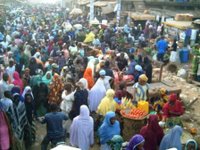 It began with the arrival of the city people; those who have been away to the urban areas. It was an occassion many won't like to miss as Ebiras trooped home to celebrate yet another Eid (sallah festival) which coincided with the New year, 2007.
It began with the arrival of the city people; those who have been away to the urban areas. It was an occassion many won't like to miss as Ebiras trooped home to celebrate yet another Eid (sallah festival) which coincided with the New year, 2007.From the 22nd of December 2006, Ebiraland began witnessing heavy traffic jams in such areas as okene and Ogaminana. It wasn't immediately clear whether the New year would bring people home as many have complained of the ecomonic situation of the country. Those who expected a low turn-out were disappointed as people arrived from different part of the country and beyond to celebrate sallah and New Year.
The Bariki (Okene main) market was flooded with people shopping for the festival. Food stuffs, Clothings and Rams enjoyed huge turn overs. As the harmattan wind blew over the town, Ebiras struggled through the market to get their items ahead of the looming inflation. While traders cpent more hours at their shops, the Tailors and dress-makers adopted 24 hour operations.
Okene main market at its fullest
For the very first time after the ugly incident of 2001 where the late Alh. Momoh Lawal Akaaba was murdered, Ebira celebrated the yuletide, the sallah and the New year in what many considered as relative peace. Even as the masqueraders paraded without reason, the commuters and pedestrians had nothing to worry about as only canes were carried by the 'Eku' and its members.
The Ram Market gets exhuasted
Activities mere much. The able visitors relaxed at the newly opened Guest House; Hiltop Guest House, Anyoke, Okene. Wedding ceremonies were countless on daily basis.
People going for the Eid prayer, Okene
A Muslim youth in Eid dress

The Eid Prayer at Markaz Ahlul Sunnah Wal Jama'ah praying ground, Okunchi

Amir of Markaz Ahlul Sunnah wal jama'ah, delivering his sermon after Eid
People returning from Eid prayer, Okene
Readers' comment
Comments
Post a Comment
Please include your name in your comments.
Thanks.